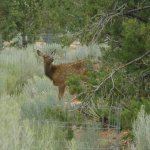Apologies this is obviously not a bird, but was photographed whilst on a birding trip, so does that count?
Deer resident in this area are, I believe, Mule and White-tailed. Unfortunately, the hind quarters are hidden, making ID difficult for those of us unfamiliar with US mammal species.
Please could someone confirm an ID?
Thanks
Kevin
Deer resident in this area are, I believe, Mule and White-tailed. Unfortunately, the hind quarters are hidden, making ID difficult for those of us unfamiliar with US mammal species.
Please could someone confirm an ID?
Thanks
Kevin








